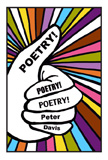June 10, 2012POETRY! POETRY! POETRY!
Review by Mary Harwell Sayler
Bloof Books
ISBN 978-0-9826587-0-3
2010, pp. 115, $l6.00
www.bloofbooks.com
If I were to call this book fresh and innovative, you wouldn’t know if I meant brilliant or weird, but that’s okay since both would be true. Although I’ve read hundreds of books of or about poetry, I can honestly say that I have never read anything like this!
Starting with the title, you might expect the book to talk about various forms of poetry or, perhaps, explain the terminology and techniques often used in well-written poems. That’s what I thought anyway, but I was wrong! wrong! wrong! Instead, the book presents poems collected around a central theme, but with another little twist: i.e., every poem in the book is a prose poem. That’s amusing in itself because traditional poets and even free verse writers usually disdain prose poetry as a contradiction in terms, creating an unlikely form that, at best, they deem to be an oxymoron and, at worse, boxy and moronic!
The form chosen for this book provided no obstacle for me though since I just recently came to appreciate prose poems as a super-cool form that’s so fun to play with I’ve now placed a few of my own. But, to use the same boring-looking form for over 100 pages yet sustain reader-interest until “The End” requires more dexterity than stacking blocks. Somehow, however, the poet manages with more than enough skill to keep these little chunks of poems from toppling over and crashing.
To use–consistently–the box paragraphing of prose poems can be tricky enough, but the poet also used a consistent title format. With the exception of two poems, the title for every poem in the book begins with “Poem Addressing…,” which sounds, well, boring. Or maybe such consistent use of blah titles might lead readers to expect the poems to be consistently blah, sloppy, slapdash, slipshod, sentimental, or some other adjective for amateurish. Anyone in their right (or left) mind might think so, but they would be wrong, wrong about that too. At least I was.
For a quick example, look at the two exceptions to the rule for titling to which the poet entitled himself: “Poem That Begs For Reassurance” and “Poem That Belligerently Addresses People Who Believe I’m Self-Obsessed or Something Like That.” Even if you think the poet might be, yeah, self-obsessed, you have to admit to the humor.
The consistent titles also range from mild to wild humor with such headings as “Poem Addressing Some of the Obstacles This Poem Will Face as It Tries to Entertain, Impress, and Succeed in the World of Poetry,” “Poem Addressing Potential Publishers of This Poem. Thanks!” “Poem Addressing People Whom I Might Be Asking to Write a Blurb for the Back Cover of the Book in Which This Poem Appears,” “Poem Addressing People Who Might Hire Me for Their Tenure-Line Teaching Position but Are Unsure about What They’re Reading,” “Poem Addressing Contemporary Poets of Whom I’ve Been Jealous on More Than One Occasion,” “Poem Addressing People Who Have Actually Decided to Write a Review of This,” or “Poem Addressing People Who Would Like Me to Contribute to Their Really Cool Journal.”
Those titles give you an idea of what you’ll find: irony, quirkiness, humor, and even a rather sweet childlike silliness. Some have called the poems “self-referential,” which in the truest meaning of the word may be true, but that does not give a sense of the tone or probable points of emanation, which often bring forth self-deprecating poems. So, for all the bravado and references to the “I” self, the poems emit an aura of shyness and the expressed need to be received, validated, and embraced by readers.
If you write poetry as well as read it, you know that also describes how most of us feel about our poems or ourselves as poets, which, in my opinion, is what this book is really about–i.e., writing poems and being poets. For example, the book opens with a “Poem Addressing the Speculation as to Who You Are and Imagining My Death Reaffirming My Life,” expressing the curiosity (or, perhaps, hopes) most of us have about our potential readers: Who are they? Where are they? Or, are they?
With the typical conversational tone maintained through the book, the first poem begins, “So you like reading I imagine,” then goes on to imagine who this reader is or where or even when. For example: “Or you could have found these words in 2074 on a sheet of paper that is wrapped around your birthday gift. Perhaps you are thinking that the wrapping paper is better than the gift. Perhaps you haven’t yet unwrapped the gift.”
Besides directly engaging the reader in that second word, second person “you,” the first poem in the book ended on a note that was, for me, poignant. This sensitivity and the titles and the humor also kept me reading with anticipation that did not lag. Then, right at the point I began to wonder what else Peter Davis could say about poetry-writing, poets, readers, academia, and publishing, I found his poems addressing economists, conspiracy theorists, and dictators, trying to get them not only to read but market his poetry! That concept alone is rather hilarious–spoofing yet seriously touching on the obsession with marketing that most of us poets actually have.
Meeting or disappointing the expectations of other people in general and readers in particular is another major concern we have as poets, too, and as regular and irregular people in everyday life. Since I want to give you another example of the poems, I’ll close by printing in full the shortest poem in the book along with my recommendation to stay ready for anything as you fully enjoy the work of Peter Davis.
Poem Addressing People with Certain Expectations about Poetry That Are Not Fulfilled in This Poem by Peter Davis
Change